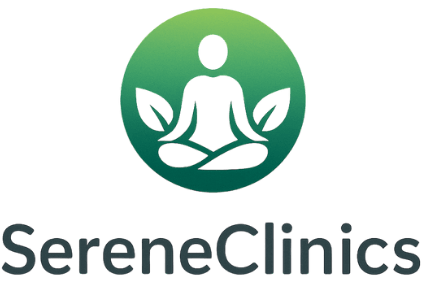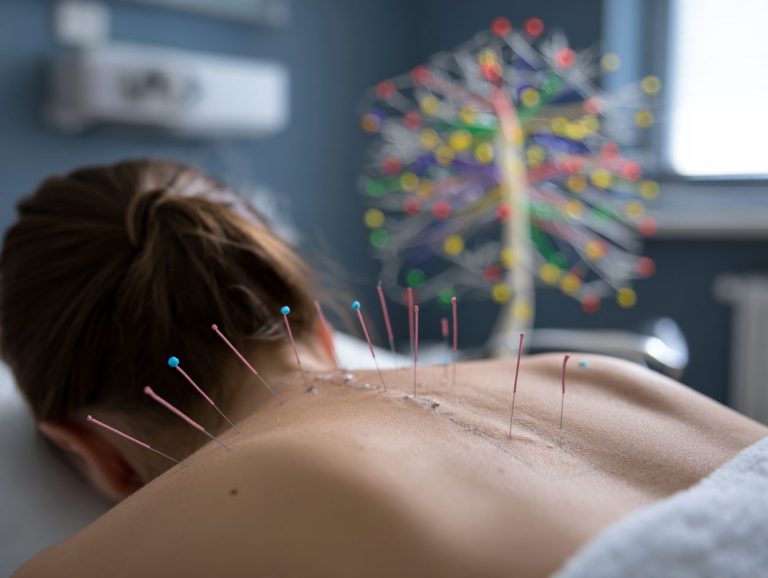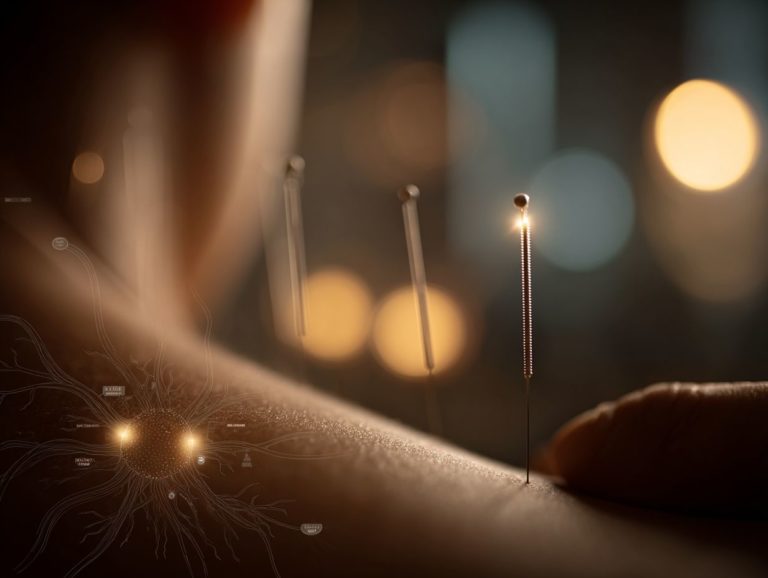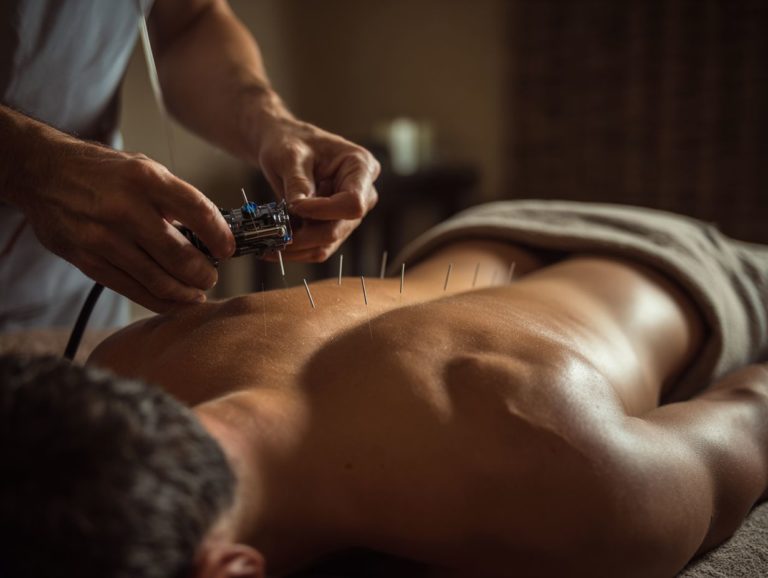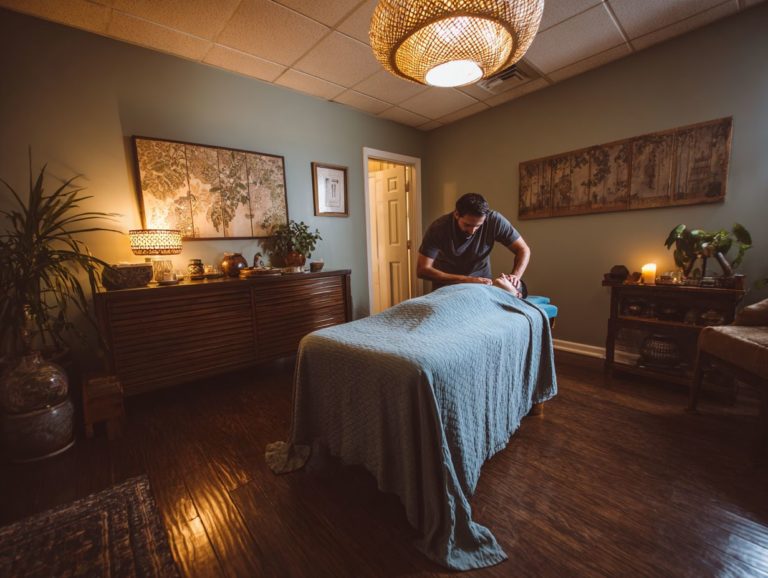Acupuncture Risks: Side Effects and Safety Measures
Acupuncture has gained popularity as a holistic approach to healing, but knowing the details is important for anyone thinking about treatment.
This article explains what acupuncture is, how it works, and the potential risks involved.
Common side effects, infection risks, and concerns about nerve damage and medication interactions are examined.
Safety measures for pregnant women and children are discussed, along with tips for finding a qualified practitioner and outlining important post-treatment care.
Your journey to informed wellness starts here.
Key Takeaways:
Contents
- 1 What is Acupuncture?
- 2 How Does Acupuncture Work?
- 3 What Are the Risks of Acupuncture?
- 4 Acupuncture Safety Statistics
- 4.1 Global Usage of Acupuncture: Countries Using Acupuncture
- 4.2 United States Acupuncture Usage: U.S. Acupuncture Use
- 4.3 Adverse Events: Organ or Tissue Injuries
- 4.4 Adverse Events: Infections
- 4.5 Adverse Events: Influence and Adoption
- 4.6 What Are the Common Side Effects of Acupuncture?
- 4.7 Is There a Risk of Infection with Acupuncture?
- 4.8 Can Acupuncture Cause Nerve Damage?
- 4.9 Can Acupuncture Interfere with Medications?
- 5 What Safety Measures Should Be Taken Before Acupuncture?
- 6 How to Find a Safe and Qualified Acupuncturist?
- 7 What Should Be Done After an Acupuncture Session?
- 8 Frequently Asked Questions
- 8.1 What is acupuncture and what are its risks?
- 8.2 What are the common side effects of acupuncture?
- 8.3 Are there any serious risks associated with acupuncture?
- 8.4 What safety measures should I take before getting acupuncture?
- 8.5 Can anyone receive acupuncture or are there certain people who should avoid it?
- 8.6 How can I have a safe and successful acupuncture session?
What is Acupuncture?

Acupuncture is a healing method from traditional Chinese medicine that has been used for centuries to help with different health problems by balancing the body’s energy, known as ‘qi’. According to an overview by Verywell Health, traditional Chinese medicine, including acupuncture, is based on principles that emphasize the balance of bodily functions.
This treatment involves placing thin needles at certain spots on the body, which can help ease pain, lower stress symptoms, and improve emotional health.
Acupuncture is known for being effective in treating long-lasting pain, anxiety, breathing issues, and even stomach problems. For those interested in exploring its pain relief capabilities, consider this hidden gem on acupuncture’s techniques and effectiveness.
How Does Acupuncture Work?
Acupuncture involves targeting certain spots on the body to help balance energy and start the body’s natural healing. This method is thought to increase the production of endorphins, which are the body’s natural painkillers. According to research published by Frontiers in Neuroscience, these effects contribute significantly to pain management and support overall health.
What Are the Risks of Acupuncture?
Though acupuncture is usually seen as safe, it does carry some risks and side effects. These can include small bruises, tenderness, and, in rare instances, infection or nerve injury, according to a systematic review published in Nature.
Knowing these risks is important for anyone thinking about this treatment for managing pain or reducing stress. To understand more about its effectiveness for pain relief, refer to [Acupuncture: Pain Relief Uses, Techniques, and Effectiveness](https://sereneclinics.com/holistic-health/traditional-medicine-systems/traditional-chinese-medicine/acupuncture/acupuncture-for-pain-relief/acupuncture-pain-relief/).
Acupuncture Safety Statistics
Acupuncture Safety Statistics
Global Usage of Acupuncture: Countries Using Acupuncture
United States Acupuncture Usage: U.S. Acupuncture Use
Adverse Events: Organ or Tissue Injuries

Adverse Events: Infections
Adverse Events: Influence and Adoption
The Acupuncture Safety Statistics The data offers a clear summary of how acupuncture is used worldwide and in the U.S., with attention on safety through reported negative effects. This information is key for knowing the acceptance and risks linked to acupuncture, helping both practitioners and users make informed choices.
Global Usage of Acupuncture showcases that acupuncture is practiced in 103 countries, indicating its widespread acceptance as a complementary therapy. However, data from 129 countries Reports indicate there are differences in how data is gathered and shared, which could affect the worldwide view of acupuncture’s extent and safety.
United States Acupuncture Usage indicates growth in acceptance, with 1% of U.S. adults using acupuncture in 2002, rising to 2.2% in 2022. This growth reflects increased awareness and acceptance of alternative medicine, possibly driven by more research supporting acupuncture’s effectiveness in managing pain and stress.
- Adverse Events: While the data shows potential risks, they appear relatively low. Organ or tissue injuries have a median of 36 cases and 4 deaths, highlighting the importance of trained professionals performing acupuncture. Infections are reported with a median of 17 cases and 0.5 deaths, suggesting a need for stringent hygiene practices. Despite these risks, the low median values indicate that with proper care, acupuncture remains a relatively safe practice.
The Acupuncture Safety Statistics data indicates a cautious but positive outlook on acupuncture’s usage and safety. As this practice expands around the world, especially in the U.S., it is very important to keep safety high and teach both professionals and patients about possible risks. This method will support the continued growth and trust in acupuncture as an important part of natural healthcare.
What Are the Common Side Effects of Acupuncture?
Common side effects of acupuncture may include temporary soreness, slight bruising, or mild fatigue following treatment, which are generally considered normal responses to the therapy.
These reactions often arise from the stimulation of acupuncture points, as the body adjusts to the release of energy and promotes increased blood circulation.
Typically, any discomfort experienced post-session is short-lived, usually resolving within a few hours to a couple of days.
To manage these effects, individuals can:
- Apply a warm compress to the affected areas,
- Stay hydrated, and
- Engage in gentle stretching or light physical activity.
Talking about your concerns with the professional can make the experience better and adjust upcoming sessions to fit your needs.
Is There a Risk of Infection with Acupuncture?
Even though the risk of infection from acupuncture is low, it can occur if the needles are not sterilized correctly. Choose a qualified practitioner.
This emphasizes the importance of following strict hygiene rules, like ensuring needles are clean before use and disposed of properly after each session.
A reputable acupuncturist will also maintain a clean treatment environment, regularly sanitizing surfaces and equipment.
Patients should feel comfortable asking about the sterilization methods in use and verifying that the practitioner is certified and experienced. Looking at reviews and asking for advice can help find a specialist who cares about patient safety.
Knowing these practices makes the acupuncture experience better and greatly lowers the chance of infections, building trust in the treatment.
Can Acupuncture Cause Nerve Damage?
In rare cases, acupuncture can potentially cause nerve damage if needles are improperly inserted or if an untrained practitioner performs the treatment.
This risk highlights the need for patients to find qualified acupuncturists who have finished approved training programs and have valid certifications.
Proper technique is essential, as even a slight misplacement of a needle can lead to complications. Individuals considering acupuncture should inquire about the practitioner’s experience and ask for referrals or testimonials from previous clients.
It’s advisable to verify their licensing and adherence to safety guidelines, as these measures significantly reduce the likelihood of adverse effects and promote a safe, effective healing experience.
Can Acupuncture Interfere with Medications?
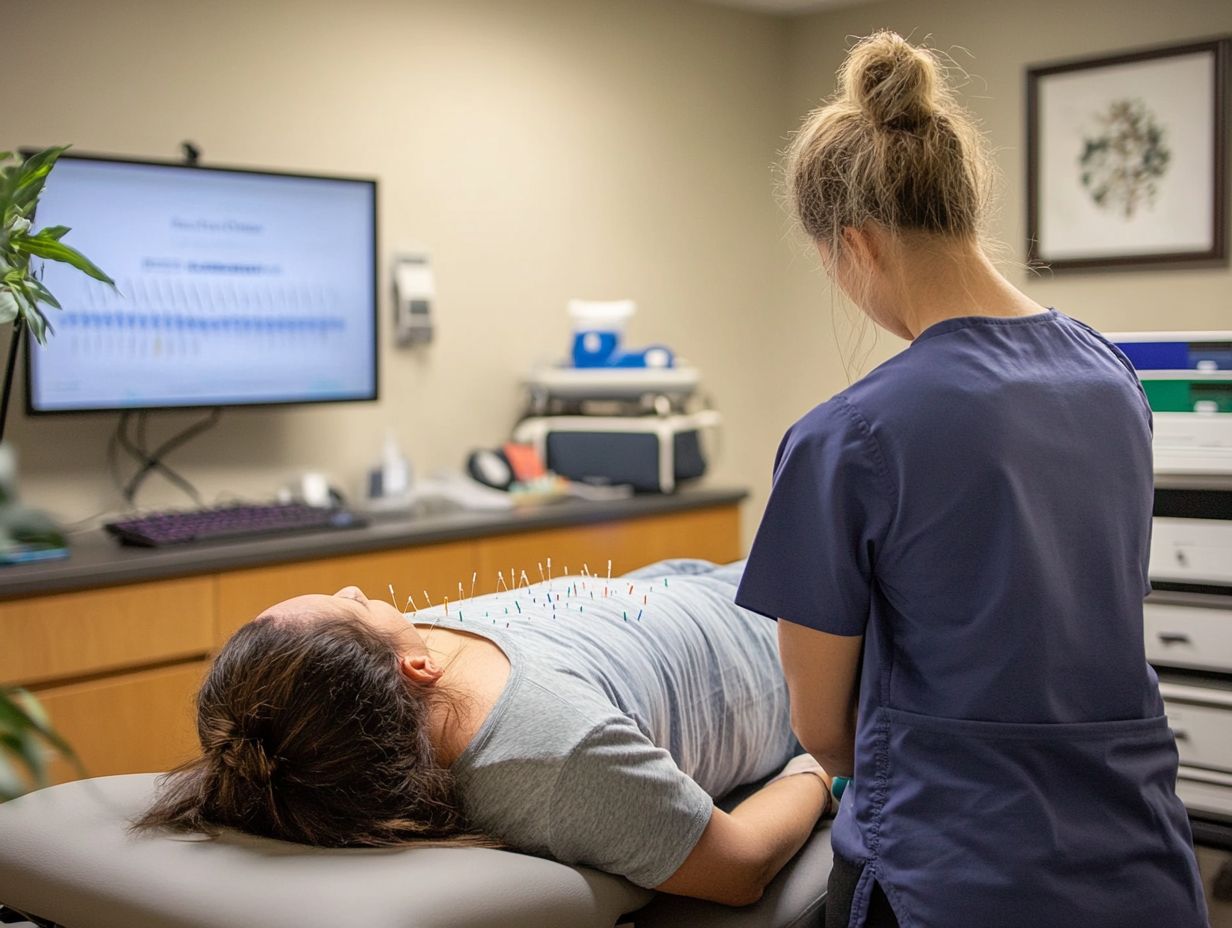
Acupuncture is usually safe to use with medications, but patients should always tell their doctors about all treatments to prevent possible interactions.
Patients should be aware that acupuncture can work alongside their treatment, but mixing it with some medications might cause unexpected problems.
Clear communication between acupuncturists and healthcare providers is important to consider all aspects of a patient’s health. For instance, certain herbal supplements often used in conjunction with acupuncture may interact with prescription medications, altering their effectiveness or leading to side effects.
Therefore, by discussing ongoing treatments openly, both sides can make informed decisions, ensuring safer and more effective care for the patient.
What Safety Measures Should Be Taken Before Acupuncture?
Before having acupuncture, make sure to check the practitioner’s qualifications and talk about any current health problems or concerns.
Is Acupuncture Safe for Pregnant Women?
Acupuncture can be a safe and effective treatment for pregnant women when performed by a qualified practitioner, addressing conditions like nausea, stress, and pain management.
It offers a full approach that can greatly help the health of pregnant women, reducing pregnancy-related discomforts and increasing energy levels.
Women may experience less anxiety and sleep problems, which often worsen during this change.
Pregnant people should talk to a certified acupuncturist who has experience in maternity care.
This makes sure that the treatment is planned safely and correctly for both the mother’s health and the growing child.
Can Children Undergo Acupuncture Safely?
Yes, acupuncture can be safely performed on children, often helping with issues like anxiety, stress relief, and even gastrointestinal problems, provided it is done by a trained practitioner.
Acupuncture is becoming more popular in child healthcare as more parents look into different treatments for their children’s health issues. It’s essential to note that younger patients often require a modified approach, especially considering their unique physiological responses.
The potential benefits extend beyond just physical symptoms; many parents have reported improvements in their child’s overall well-being, sleep quality, and focus.
To effectively use acupuncture for this group, practitioners need special training to treat children. This includes using techniques and needle placements suited for their smaller, sensitive bodies.
What Should Be Discussed with the Acupuncturist Before Treatment?
Before starting treatment, talk to your acupuncturist about your full health background, the medicines you take now, and any particular health problems. This helps create a safe and customized plan.
This first conversation sets up a solid treatment plan and gives patients the chance to talk about any worries, choices, or previous experiences with other treatments.
Patients should detail their lifestyle habits, such as diet and exercise, as these can significantly influence treatment outcomes. Looking after emotional health and stress is important because acupuncture can help improve overall well-being.
When patients and doctors talk openly, they can set realistic goals together, ensuring each session fits the patient’s health plan and desired results.
How to Find a Safe and Qualified Acupuncturist?
To find a safe and qualified acupuncturist, people should look into their credentials, ask for recommendations, and see if the practitioner is covered by insurance for acupuncture services. If interested, exploring various techniques like manual acupuncture can also provide valuable insights into what to expect during a session, as detailed in our resource on Manual Acupuncture: Techniques, Differences, and US Certification.
What Should Be Done After an Acupuncture Session?
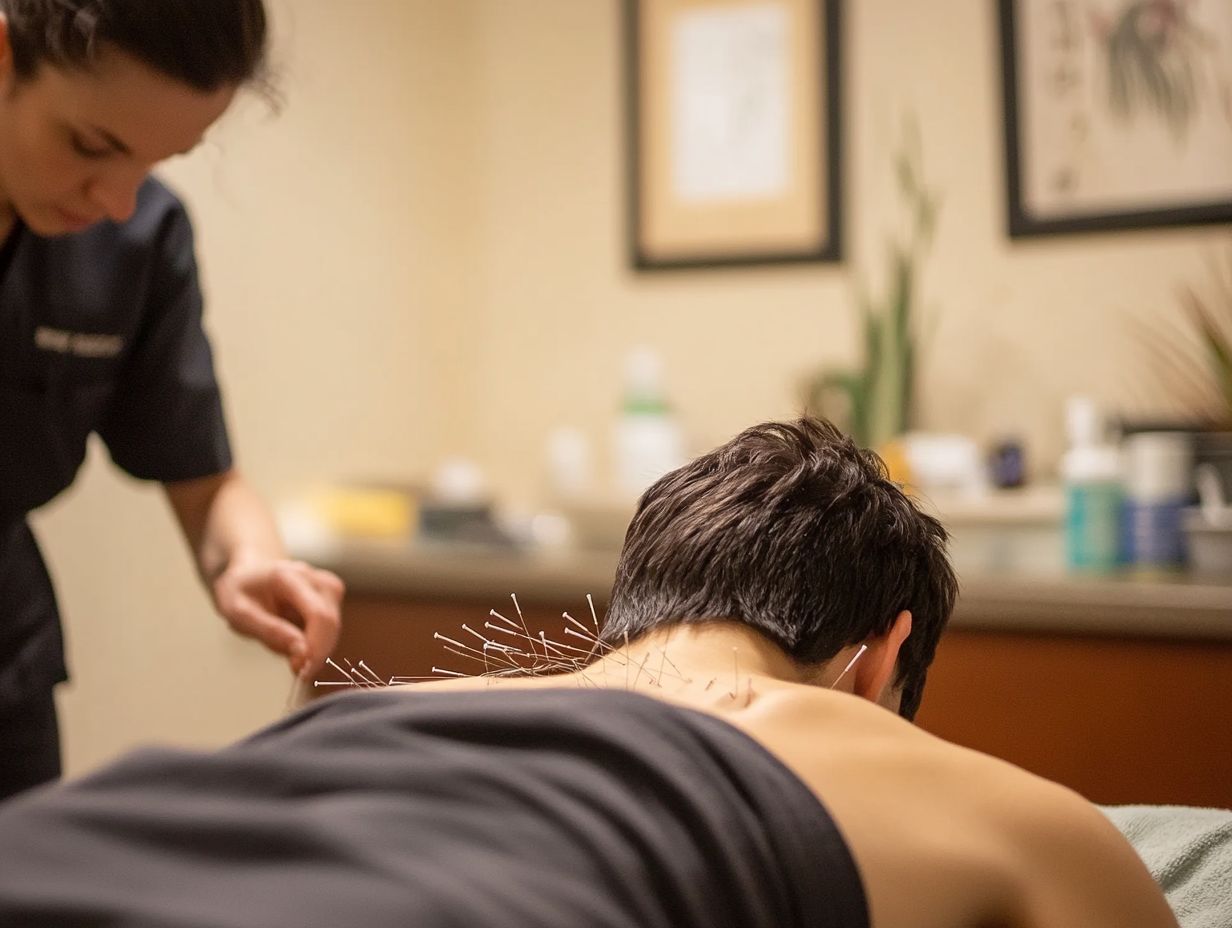
After an acupuncture session, patients should take steps for care afterwards, which includes:
- Drinking plenty of water
- Resting
- Watching for any side effects
These actions support good recovery and results.
Are There Any Post-Treatment Risks or Side Effects?
Post-treatment risks associated with acupuncture may include mild soreness, fatigue, or emotional fluctuations, which are generally normal but should be monitored.
Patients should know that while these effects usually go away by themselves quickly, symptoms that last could mean further checks are needed. It’s important for individuals to listen to their bodies and recognize when something feels off.
If you notice signs like more pain, ongoing tiredness, or unexpected emotional upset, it’s best to contact the acupuncturist right away. This professional can provide guidance and determine whether additional treatment or a different approach may be necessary to address any concerns that arise after the session.
Frequently Asked Questions
What is acupuncture and what are its risks?
Acupuncture is a form of traditional Chinese medicine that involves inserting thin needles into specific points on the body to alleviate pain and promote healing. Like any medical treatment, there are potential risks involved with acupuncture, such as infection, bruising, and nerve damage.
What are the common side effects of acupuncture?
The most common side effects of acupuncture include minor bruising, bleeding, and soreness or discomfort at the insertion site. Some people may also experience dizziness, fatigue, or mild headaches after acupuncture.
Are there any serious risks associated with acupuncture?
While serious risks are rare, there have been reported cases of infection, punctured organs, and nerve damage from acupuncture. To reduce these risks, find treatment from a certified and licensed acupuncturist.
What safety measures should I take before getting acupuncture?
Before getting acupuncture, make sure to inform your practitioner of any medical conditions, medications, or allergies you have. It’s important to make sure the needles are clean, and the person doing the procedure washes their hands and wears gloves during the treatment.
Can anyone receive acupuncture or are there certain people who should avoid it?
Most people can safely receive acupuncture, but there are some conditions that may make it unsuitable for certain individuals. These include bleeding disorders, pacemakers, or a compromised immune system. It is important to consult with your doctor before starting acupuncture treatment.
How can I have a safe and successful acupuncture session?
For a safe and effective acupuncture experience, find a treatment from a professional with proper licensing and experience. It is also essential to disclose all relevant medical information and to follow any post-treatment instructions provided by your acupuncturist.

Sheetal Sharda has a background in CS. She got an interest in Holistic living back in 2018, and has since started exploring more into Naturapathy, Holistic Living, Yoga, and more. She got inspired to start SereneClinics to help people find reliable centers across the world.
